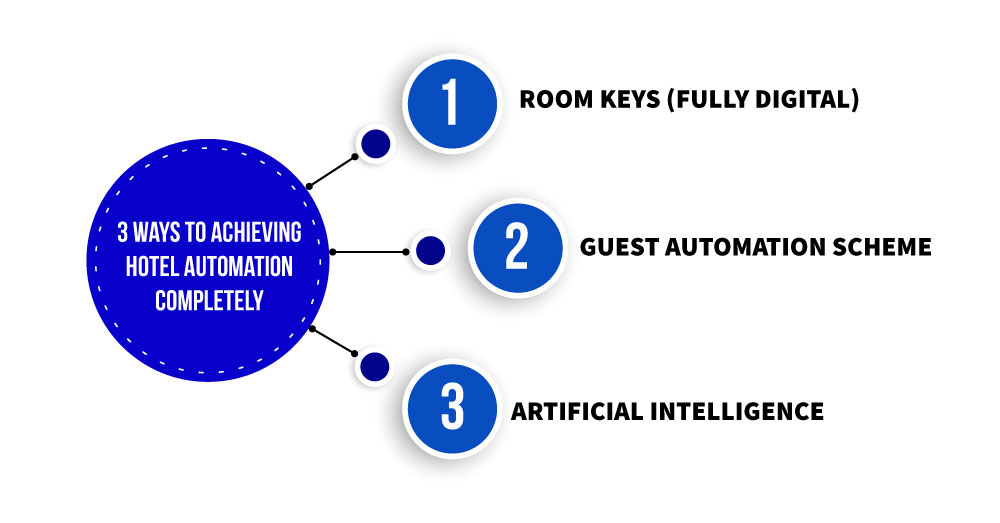How to achieve a fully automated hotel with Hotel Automation System?

- Apr 01, 2021
- by Spikebot
How to achieve a fully automated hotel with Hotel Automation System?
To be very clear, we all are surrounded by smartphones or smart gadgets. Even the concept of smart homes and automation is at its peak and will see new heights shortly. With the growing idea of the smart home – even the hotel industry has started adopting it quickly. And don’t worry if you hear or read “Fully Automated Hotel” more often soon as the IoT hotel automation trend has begun.
The self-service trend has been the currency of the new age. Consequently, when it comes to hotel lodging, travelers expect to have the same self-service options. Many hotels are achieving this through IoT-based hotel automation.
This blog post from Spikebot, a pioneer in Automation in-home and even for hotels, will talk about how Businesses can implement smart hotel automation using it for certain aspects of the hotel to give guests a soothing experience and travelers.
Let’s begin with the stats story.
Things to consider while adapting it hotel automation
Hotels have embraced IoT-based hotel automation to optimize their processes and revolutionize the customer experience. Technology plays an essential role in providing a smooth customer experience, from room booking and front desk activity to room facilities and billing.
Furthermore, automation can turn wasteful, isolated, and separated systems into synchronized, streamlined, and simpler workflows. Hotel automation system using IoT improves overall consistency and productivity by simplifying tasks and simplifying tasks. It also provides a smooth and reliable end-to-end consumer service.
1. User Adoption
Being into the hotel industry, it does not matter what technology you are bringing in to the company in the name of smart hotel automation using it if it is challenging to incorporate and utilize regularly, consumer acceptance fails, and the technology is either not used correctly or not used to its maximum extent.
2. Check out the Usability
The hotel industry is well-known for having one of the highest turnover rates in any company. Estimates usually vary between 30% and 40%. At peak season, the consequences of attrition are exacerbated.
Usability is critical, particularly for IoT-based hotel automation with high churn rates. When the technologies on which they depend lets them catch up during crucial low-staff times and preparation is limited for fast onboarding of new staff, it makes current employees comfortable and productive.
3. Efficiency
Workers who do not utilize IoT hotel automation technologies properly or are less effective and therefore less active in servicing visitors. “If you increase productivity, you have fewer distractions for the workers, then they will naturally start giving better guest service,” says Jon Inge, a long-time hotel technology consultant.
Furthermore, a completely optimized engineering platform saves resources on basic routine processes and monitoring. Many functions may be streamlined when networks are correctly connected, and different tools customized to the hotel’s business model can be quickly introduced or eliminated.
Three ways to achieving hotel automation completely
A completely automated hotel is suitable for the exiting traveler; it is a hotel with no employees. People wonder if it is successful – is getting no human workers actually what people want? Let’s discuss three approaches to set up IoT hotel automation and how it will help guests.
1. Room Keys (Fully digital)
The modern age of hotel entry is smart key and cardless, and it is redefining guest service expectations. The Marriott MobileApp, as in the case of 17 Marriott Hotels, is now the room key for visitors, allowing them to bypass the front desk and check-in to obtain entry to their room and other hotel facilities.
This IoT-based hotel automation frees up hotel employees, enabling them to interact with visitors and provide them with an excellent experience. It also aids the hotel in branding and acquiring a dedicated client base. However, OTAs such as Expedia can offer hotels a run for their money by introducing keyless entry into their mobile-booking apps!

2. Artificial Intelligence
The 214-room Shangri-La Hotel in Abu Dhabi has successfully introduced a cutting-edge Guest Automation Scheme. As the hotel reservation system changes a room’s status from “Vacant” to “Occupied,” the central station sets the room temperature appropriately as visitors approach their room.
This smart hotel automation also offers practical operational details such as staff response to guest calls, energy savings data, room occupancy status, and so on, and dramatically decreases manual mistakes by hotel staff.
3. Artificial Intelligence
Hotels are now integrating AI and digital room features to create one-of-a-kind and unforgettable consumer experiences. For example, suppose a visitor programs a room to “wakeup” in the morning. In that case, AI might activate automatic features such as the drapes opening and turn on a favorite news or radio station.
Currently, the Al Ain Rotana Hotel in the UAE, which has 90 guest rooms, offers in-room personalization. As part of the hotel automation system using IoT, each room has a smart bedside console from which the guest can control all of the lightings in the room, turn on or off the air conditioning, and change and view the temperature in the room.
The smart technology may even use AI to alert hotel guests to catch lunch or treat from the onsite bar and restaurant, arrange a room cleaning service, or incorporate a spa service to their stay, in the form of push marketing deals or chatbots.
Conclusion
So, we have discussed what to keep in mind while opting for IoT hotel automation and how you can transform a hotel into a fully automated hotel by a hotel automation system using IoT.
If you not aware of what to do and how to do it? Just drop your all queries on [email protected], or you can call us at any time at +91-7096935568. We will be happy to become your representative for your automated hotel vision.
